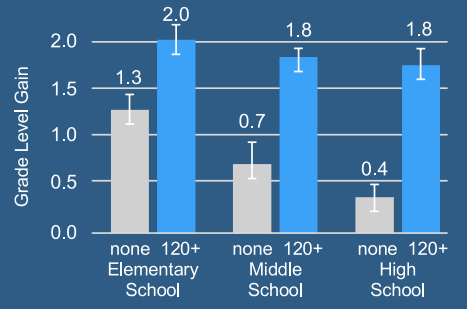
Summary of Findings:
Across all grade groups, students in special education who completed 120+ Reading Plus lessons (about 50+ hours) during the school year achieved significantly larger reading proficiency gains than students who did not engage in Reading Plus instruction.
These results show that students in all tier groups who engaged in the recommended amount of Reading Plus instruction over the course of the 2018-2019 school year significantly increased their capacity to comprehend increasingly complex texts, developed their capacity to understand higher levels of general academic vocabulary, and improved their reading efficiency. Students who completed more Reading Plus lessons achieved significantly larger gains than their peers who engaged in little or no Reading Plus practice. The results also showed that students who engaged in more Reading Plus instruction developed more reading confidence and increased their interest in reading. This in turn increases the likelihood that they will continue to use reading as a means to expand their knowledge, to be entertained, and to seek inspiration.
Study Design:
This report describes the progress achieved by Reading Plus students who received special education services while enrolled in grades 2 through 12 during the 2018-2019 school year. Data are reported for all students who completed the Reading Plus InSight silent reading assessment on at least two occasions, once near the start of the school year and again during the spring, so that growth over the school year was measured.
Students Excluded
Students for whom valid reading rates could not be calculated.
Distribution of Students
- Elementary School (ES, Grades 2 through 5) n=899
- Middle School (MS, Grades 6 through 8) n=3,274
- High School (HS, Grades 9 through 12) n=3,655
Key Results:
Among students enrolled in special education, Reading Plus instruction generally had a positive effect on students’ self-reported reading interest and reading confidence (self-efficacy). Previous research has found that reading motivation and reading success are closely linked.

